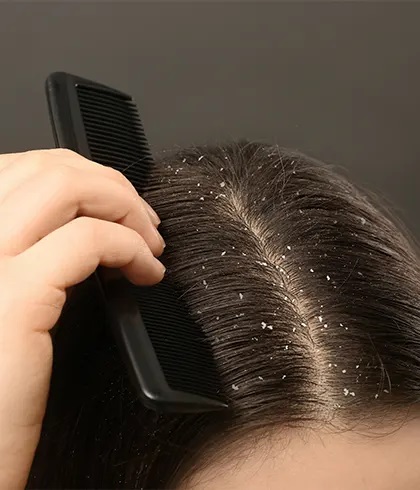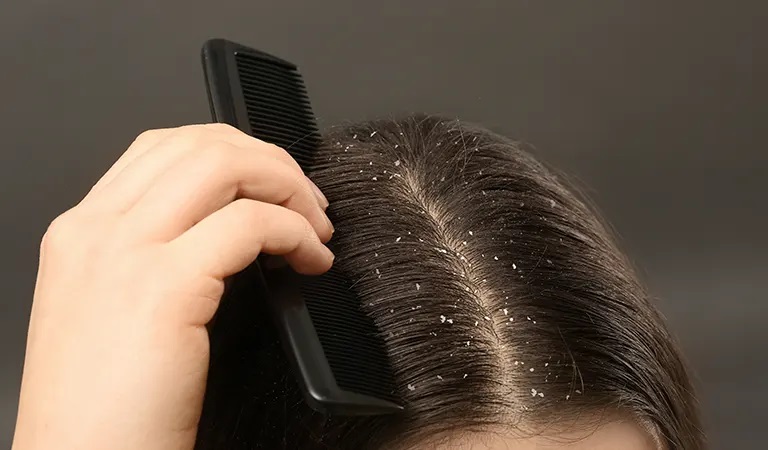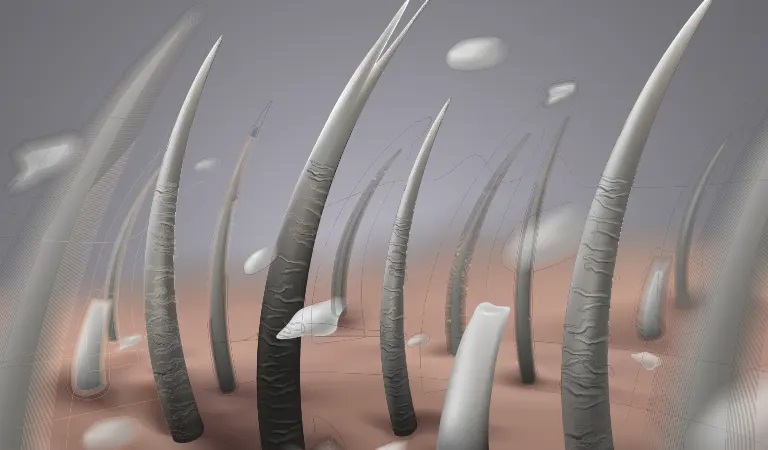

7 Hacks to Get Rid of Dandruff at Home In Winter
Dandruff is a common scalp condition that affects nearly 50% of the global population, as noted by the National Center for Biotechnology Information (NCBI). During winter, the cold and dry air strips moisture from the scalp, leaving it flaky, itchy, and irritated. Lower sweat production in colder weather further disrupts the scalp’s natural oil balance, making dandruff even more persistent.
While many turn to medicated shampoos for quick relief, natural remedies are gaining popularity for being gentler on the scalp and free from harsh chemicals. Simple ingredients like coconut oil, aloe vera, and tea tree oil can restore scalp health and prevent flakes—right from the comfort of your home. In this article, we share 7 effective home hacks to help you tackle dandruff this winter, naturally and safely.
- Vinegar
Vinegar has long been used in traditional scalp care for its antifungal and antibacterial properties. According to natural health experts, its acidic nature helps balance the scalp’s pH level, which can reduce fungal growth and flaking commonly associated with dandruff.
For best results, mix equal parts of white vinegar and water, and apply the solution directly to the scalp. Leave it on for about 30 minutes before shampooing. This not only helps remove buildup and reduce dandruff but also leaves the scalp feeling refreshed and clean. However, avoid using undiluted vinegar directly on the skin, as it may cause irritation in sensitive individuals.
- Baking Soda
Baking soda is excellent to cleansethe scalp and regulates the pH balance. Simply mix a teaspoon into your shampoo before washing your hair. For optimal results, you'll need to stick to this practice for roughly a week.
- Aloe Vera
Aloe vera gel has a variety of medicinal effects and is easily available at stores or cultivated at home.According to NCBI, aloe vera has the potential to seal in moisture and encourage healing, as well as minimize irritation and itching caused by dandruff. Because of its antibacterial and antifungal qualities, it is useful in the treatment of dermatitis and dandruff.

- Coconut and Lime Juice
Coconut oil's hydrating qualities and lime juice's acidic pH are ideal for winter dandruff. Lime juice washes the scalp and includes citric acid, which helps to balance the pH of the scalp. This prevents growth of the dandruff fungus. Coconut oil hydrates the scalp and hair strands, keeping them healthy and lustrous.
- Garlic
Garlic, indeed! Although its pungent odor may put some people off, its medicinal potential cannot be underestimated. Garlic contains anti-fungal qualities, thus it can be used to treat dandruff. Pound a clove or two of garlic and apply it to your scalp after mixing it with water for immediate effects. If you can't stand the stench, try mixing it with some honey and ginger.
- Eggs Yolks
Egg yolk is rich in biotin and healthy fats that nourish the scalp and help reduce dandruff caused by dryness. It also supports healthier, shinier hair.
Take 1–2 egg yolks and massage them into your scalp. Wrap your hair with plastic or a shower cap and leave it for about an hour. Then, shampoo thoroughly to remove the smell and residue. Regular use can improve scalp hydration and reduce flaking naturally.
- Fenugreek
Fenugreek (methi) seeds are excellent for removing dandruff. All you have to do is soak one tablespoon of methi seeds in two cups of boiling water overnight and then roughly grind it in. To get rid of dandruff, strain the water and use it as a rinse.
Homeopathic treatment
According to a study published on Researchgate, homeopathic medicine takes a comprehensive approach to treating seborrheic dermatitis. Homeopathic treatments are extremely successful at treating dandruff while causing no adverse effects.
Homeopathy takes an individualized holistic approach, and efficiently treats the underlying causes of dandruff or dry scalp, such as thyroid disease or mental stress, hence preventing hair loss caused by dandruff or a dry scalp.
Dr Batra's® Healthcare has successfully treated over 1.4 million patients for various conditions including dandruff. At Dr Batra’s® Healthcare, our team of homeopathic specialists creates a tailored dandruff treatment plan based on the medical science of homeopathy. For the patient's overall health, we provide homeopathic medications also lifestyle, dandruff management, and hair care guidance.
Key Takeaways
- Dandruff affects up to 50% of people, especially in winter when skin and hair become dry.
- Cold weather reduces sweating, causing a moisture imbalance that leads to dandruff.
- Over-the-counter treatments exist, but natural remedies can work well too.
- DIY natural treatments are effective in managing dandruff during winter.
- The blog offers 7 home remedies to help reduce dandruff naturally.
FAQs
Why is dandruff more common in winter?
Can natural remedies help treat winter dandruff?
How often should I apply oil in winter to prevent dandruff?
Is hot water bad for dandruff in winter?
When should I see a doctor for winter dandruff?

